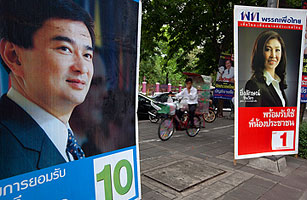
Thaksin Shinawatra, Thailand’s exiled former Prime Minister, likes to compare himself to Aung San Suu Kyi, the leader of Burma’s pro-democracy movement. Both are in conflict with their country’s military-backed leaders. But that’s where the similarities end. Suu Kyi is a Nobel Peace Prize winner, whereas Thaksin backed two violent anti-government protests. Suu Kyi spent more than decade under house arrest for her political convictions, while Thaksin fled rather than do time for corruption. Suu Kyi is a champion of democracy, Thaksin’s critics call him an autocrat.
But as Thailand heads toward a national election this weekend, Thaksin looks set to get a new lease on his political life. The Pheu Thai party, which he controls from Dubai, is poised to defeat incumbent Prime Minister Abhisit Vejjajiva and his Democrat Party. And the person he can thank for that turnaround is the woman he hand-picked to lead and who may become Thailand’s first female prime minister: Yingluck Shinawatra — his youngest sister.
Although Yingluck Shinawatra has never held office, the 44-year old executive has emerged as this election’s brightest political star. She either carries the sheen of the Shinawatra name or the taint of Thaksin, depending upon a Thai’s political point of view. Many aren’t sure what to think; Polls show between 20% and 40% of voters remain undecided. The split reflects lingering anger about the violent protests that rocked Bangkok last year. To sway voters, Yingluck has cast herself as a pacifist: “As I am a female I do not encourage violence. I will unite Thailand,” she told Time.
Indeed, Yingluck displays none of her brother’s notorious temper. With her soft physicality, photogenic looks and ever-present smile, she has the aura of the “good girl” that so many Thais root for in television soap operas. “Her gender, in Thailand’s male-dominated politics, also serves to take the edge off her party’s portrayal as representing a dangerous autocratic extreme,” says Hasan Basar, the founder of Bangkok Public Relations.
Although her opponent, Oxford-educated Abhisit, also has soap-star looks, he is backed by the military. Top generals haven’t been shy about urging voters to elect what they call “good people,” a euphemism for non-Pheu Thai candidates. The military’s involvement “drives people away,” says Pavin Chachavalpongpun of the Institute of Strategic and International Studies in Singapore. “They don’t appreciate the direct intervention in politics.” It also sets up a dynamic reminiscent of Burmese politics, where powerful generals appear to bully ‘The Lady.’ Yingluck certainly isn’t Aung San Suu Kyi, but the narrative could sway some of the undecided.
If it doesn’t, Yingluck and her party are offering voters a raft of goodies: free tablet computers for one million students, a guaranteed rice price, credit cards for farmers and taxi drivers, and debt moratoriums. Economists worry that the programs will create unmanageable levels of government debt. The Democrats are offering their own populist package, but it pales in comparison to Pheu Thai’s giveaways.
Although much is still unknown, most analysts predict that Pheu Thai will win the most seats but not an outright majority in Thailand’s 500-seat House of Representatives. In that case, the military may lobby smaller parties to join a Democrat-led coalition government. Even if Pheu Thai wins an outright majority, or succeeds in putting together a coalition, uncertainty may persist. Victors have been disqualified in the past. “If the traditional elite decide to overturn the results, a new round of violent conflict may start,” says Pavin.
As Prime Minister Yingluck could also generate conflict by granting her exiled brother amnesty, allowing him to return to Thailand. She’s vowed to clear anyone charged with political crimes in the aftermath of the 2006 coup, including her brother. “That would be a mistake,” says Pavin. Yingluck has now back-tracked, saying only that a committee will consider amnesties. Few, however, believe she won’t facilitate her brother’s return. “For a Thai, where family bonds and loyalty are extremely important, it is perfectly natural and ‘right’ for her to do as her older brother would want her to do,” says Hasan.
The country is so politically polarized that some prominent Thai columnists express fear of a civil war between Thaksin camp and anti-Thaksin factions . Jon Ungpakorn, a former Senator, warns of a “long and violent civil war.” “The next opportunity for reconciliation may well not arrive again for many years,” he wrote.
In that sense, Sunday’s election may be the easy part. With so many post-vote scenarios and warring factions, the future of Thailand, once regarded as the most stable country in Southeast Asia, looks anything but bright.
See TIME’s Pictures of the Week.
See the Cartoons of the Week.